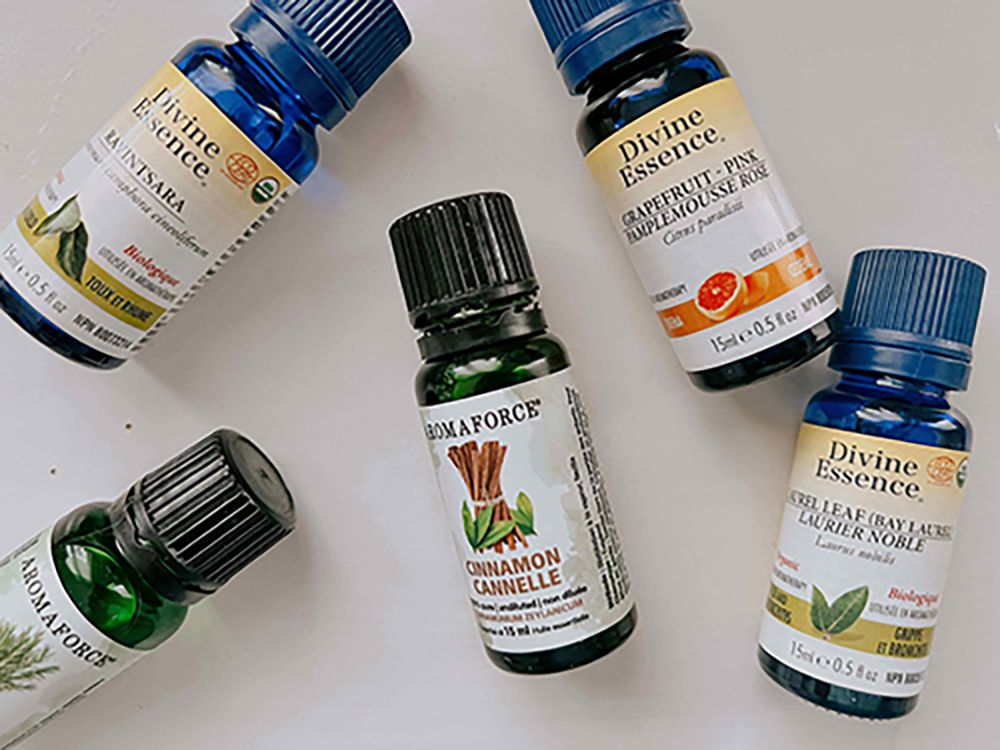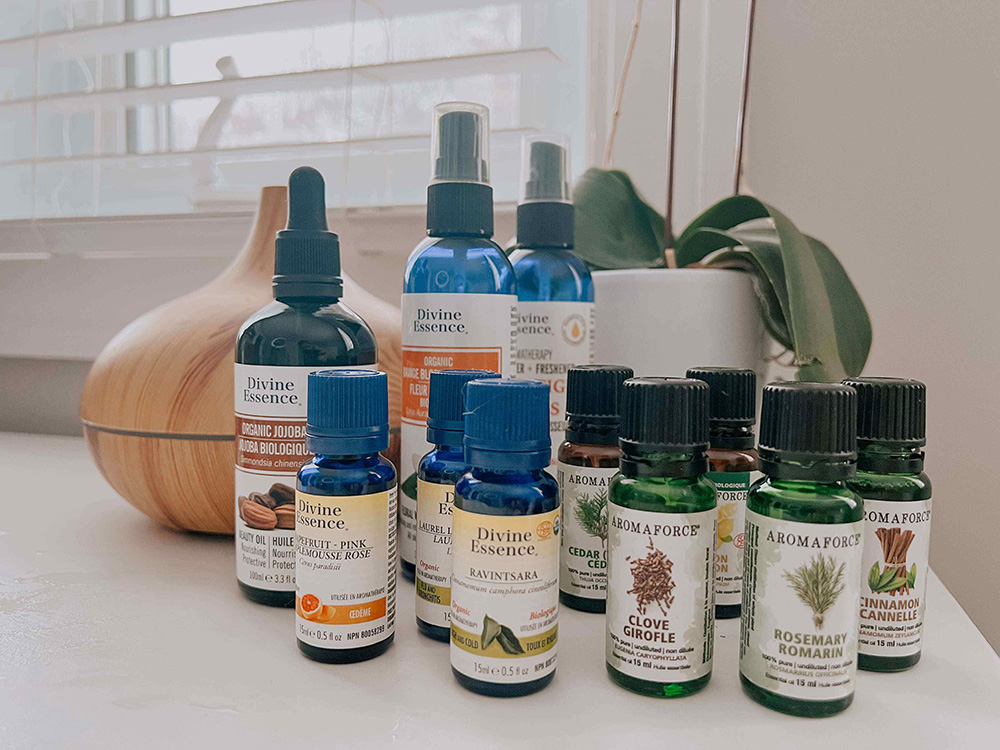Discover how, when well integrated into your daily routine, these small oils with surprising properties can bring you the wellbeing and energy that you sometimes miss in the heart of winter.
What are essential oils? They are the essence of a plant, a gift from the earth. More specifically, the natural compounds contained in the seeds, roots, flowers, fruits, or bark of certain plants are very powerful and concentrated chemical compounds. These are essential oils. The power of nature in a bottle that perfumes our homes in addition to lending itself to a multitude of uses. To me, they are allies in taking care of my body and my mind. Below, I share with you some of my favourite essential oils for winter, as well as some recipes.
What is aromatherapy?
Aromatherapy is the use of aromatic plant extracts (essences and essential oils). Specialists call this branch of alternative medicine Phytotherapy. This way of using plants is ancient. Plants and their aromas have always been essential to human health.
Essential oils can be used in different ways; they can be inhaled, diffused (they smell so good!), or applied to the skin (with an oil). They have several interesting properties as they soothe, energize, and also help to strengthen the natural defenses of the skin, as well as the digestive, nervous, and respiratory systems.
In our home, there is an essential oil diffuser on each floor and even in all the rooms. I got into the habit of turning them on in the morning and evening. Especially in winter, it is a good way to clean the air.
According to Ayurveda, the ancient holistic health system which originates from India, winter is dominated by the dosha Vata, which is characterized as dry, long, light, clear, and moving. In order to balance out these effects of Vata, which can present as dry and cracked skin, anxiety, and insomnia, there are certain essential oils which are favoured for their warming, centering, and cooling effect.
Warm, sweet, or bitter smells are best during the winter. Cinnamon, ginger, sandalwood, citrus, clove, and peppermint oils balance the effects of Vata. That said, we must not limit ourselves to these; the important thing is to use the ones we like and which do us good.

Quality of the oils
If it is a diluted oil, its oily carrier must be indicated. Conversely, the mention 100% pure must be indicated if it is not diluted, nor cut, nor lengthened by other oils. At Rachelle Béry there are different ranges of high-quality essential oils. For example, I like those from Aromaforce and Divine Essence, which are 100% pure, natural, and unaltered.
Essential oils for a gentle and energizing winter
Ravintsara essential oil
This is the star essential oil of winter. If I had to choose one, it would be this one. It supports the immune system thanks to its immunostimulant action.
It has antiviral and expectorant properties which are useful in the case of colds, coughs, bronchitis, otitis, sinusitis. Thanks to its neurotonic action, it stimulates in case of fatigue or soothes in case of sleep disorder.
Use: Direct inhalation from the bottle or a handkerchief is a quick and effective way to improve mood or deal with colds. I like to diffuse it in a diffuser to soothe and to help with sleep. It can also be diluted with a vegetable oil such as jojoba oil from Divine Essence or Sweet Almond from Aromaforce to make a soothing and nourishing massage oil.
Grapefruit essential oil
Grapefruit essential oil is extracted from the peels of grapefruit (also called Citrus X paradisi Macfadyen).
It has aerial antiseptic properties; it is indeed a powerful disinfectant, very practical in diffusion to benefit from its bactericidal and antiviral properties.
For relaxation, I mix it into an oily preparation and massage this mixture into each inner face of the wrist. Then, I bring both hands together, covering my nose, and take three slow, deep breaths of the mixture. I renew as soon as the need arises.
Peppermint essential oil
This oil is one of my favourites. Very useful in winter in case of fatigue, it can soothe inflammation of the respiratory tract and mouth. It is also effective in relieving headaches and it smells fresh, which always lifts my spirits on winter days.
Use: Pour 3 or 4 drops into very hot water and inhale the scent. In case of fatigue or headache, apply 1 drop on each temple. Do not apply too close to the eyes.
When oils are applied to the skin, they are easily absorbed by the skin and transported through the body. You can observe this phenomenon when you rub a clove of garlic under the soles of your feet—you can smell it almost right away!

Cinnamon essential oil
This is undoubtedly the most anti-infectious essential oil and the most effective against bacteria. It kills 99.99% of germs, including those resistant to antibiotics!
Use:
In dry inhalation: inhale the essential oil from the bottle or put 1 to 2 drops on a handkerchief and breathe in.
In atmospheric diffusion: use cinnamon essential oil in small quantities for diffusions, and always mix it with other softer essential oils.
Some precautions when using essential oils
Before ingesting them or putting them on the skin, dilute them in vegetable oil or any other fatty or sweet substance.
When in doubt, always check with an aromatherapist or your healthcare practitioner. Special care must be taken when it comes to pregnant women and young children.
Children under 3 years old should not be in contact with essential oils containing menthol (peppermint or field mint) because there is a risk of laryngeal spasms which can cause asphyxiation. For pregnant women, these essential oils can induce labour.

